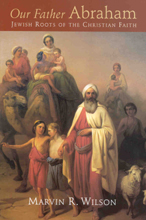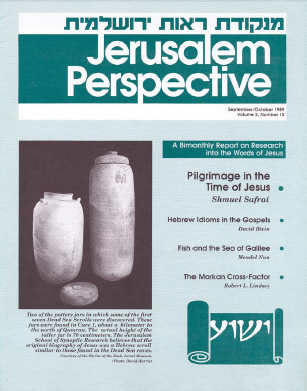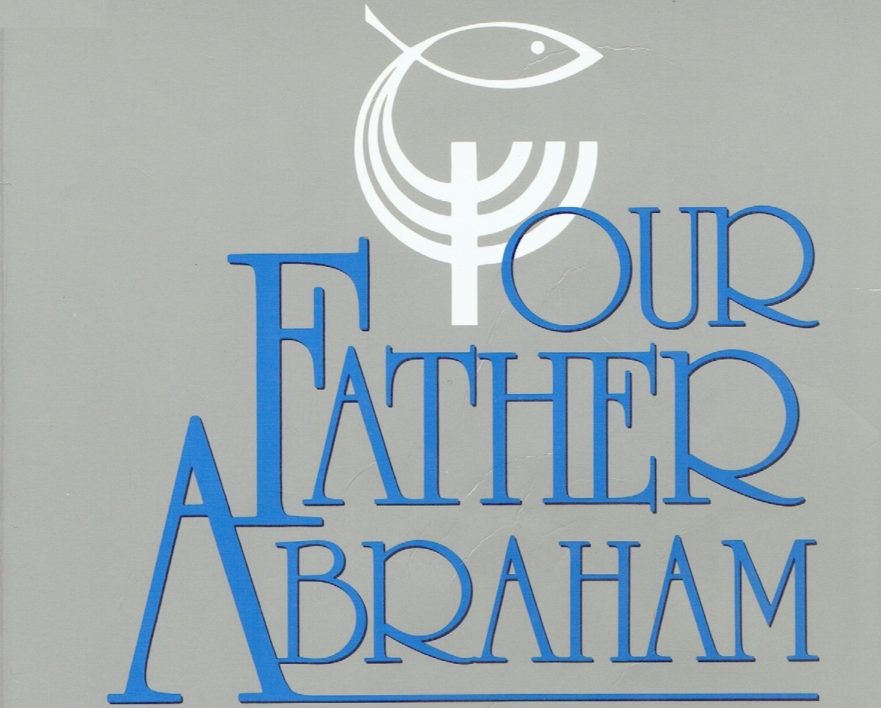For too long discussion of the Jewishness of Jesus has remained academic. Few scholars have had the interest or ability to unfold the practical meaning of the Gospels’ Jewish roots for today’s Church.
Marvin Wilson, professor of Biblical and Theological Studies at Gordon College, has finally filled that void with Our Father Abraham. And the result is simply revolutionary. For the first time someone has given the person in the pew an understanding of just what the Jewishness of Jesus means for his or her everyday life.
 Our Father Abraham begins with a useful survey of the Jewish origins of the Church and provides some fresh perspectives on the early relationship between Jews and the Jewish disciples of Jesus. For example, Wilson points out that according to recent historical research from Israel, the בִּרְכַּת הַמִּינִים (bir⋅KAT ha⋅mi⋅NIM, a first-century prayer against heretics) was not specifically formulated for use against Jewish followers of Jesus, as has often been maintained. The book also clears up a number of popular misconceptions about Judaism. One of the most widespread is the belief that Judaism teaches salvation by works, when in fact Judaism in the time of Jesus, and today, maintains that it is only through the mercy of God that salvation is obtained.
Our Father Abraham begins with a useful survey of the Jewish origins of the Church and provides some fresh perspectives on the early relationship between Jews and the Jewish disciples of Jesus. For example, Wilson points out that according to recent historical research from Israel, the בִּרְכַּת הַמִּינִים (bir⋅KAT ha⋅mi⋅NIM, a first-century prayer against heretics) was not specifically formulated for use against Jewish followers of Jesus, as has often been maintained. The book also clears up a number of popular misconceptions about Judaism. One of the most widespread is the belief that Judaism teaches salvation by works, when in fact Judaism in the time of Jesus, and today, maintains that it is only through the mercy of God that salvation is obtained.
Wilson continues with a review of anti-Semitism, primarily emphasizing the de-Judaization of the Church. This process was completed by the end of the second century and resulted in a tidal wave of Christian anti-Judaism. Wilson focuses on what the twin diseases of anti-Semitism and de-Judaization have cost the Church. Spiritually severed from its Jewish foundations, the Church adopted much of the Platonic thought that prevailed in the Greek world.
Perhaps the best example is the influence of Platonic thought on Christian understanding of sex and marriage. Platonism sees the body as imperfect and a source of evil, while the spirit is viewed as something pure that demands release from the body. Because of this, celibacy came to be considered a holier state for the Christian, with marriage reserved for the spiritually weak and those unable to control their “earthly passions.”
The Hebrew concept of marriage is quite different. From biblical times until today, Jewish teaching has consistently affirmed the goodness of marriage and family. As Wilson notes, “the Song of Songs celebrates sexuality and human love in bold terms. The Hebrews were far from those who displayed an indifference or blandness about life. Though not hedonistic, their life-style was physical and robust.” Except for the Essenes, it was almost unknown in Jewish tradition to remain unmarried. With this in mind, Wilson points out, “It is not surprising that biblical Hebrew has no word for ‘bachelor.'”
The author warns that once the Church strays from its Jewish heritage, distortion is bound to follow. He illustrates this with selected studies on community, family life and discipleship. In each of these areas he shows how the Church has lost sight of the biblical/Jewish ideal.
Wilson offers a number of helpful suggestions that will enable Christians to adopt “a Hebraic orientation toward life and the world.” He suggests three general areas for this: personal interaction, personal education, and personal action or righteous living. As regards the latter, the author states: “Orthodoxy (correct or straight thinking) must lead to orthopraxy (right doing)…. Christianity must be careful that it does not allow dogma (the way to believe, prescribed by creed) to overshadow halakhah (the way to walk or live). Both concepts must be held in balance.”
Developing a Hebraic orientation after 1900 years of de-Judaization is not easy. One needs what Wilson calls “a Jewish heart… a personal living feel for the world of Judaism.” Ultimately this will allow Christians to gain a fuller understanding of what the Bible teaches, and a richer appreciation of life.

Paid Content
Premium Members and Friends of JP must be logged in to access this content: Login
If you do not have a paid subscription, please consider registering as a Premium Member starting at $10/month (paid monthly) or only $5/month (paid annually): Register
One Time Purchase Rather Than Membership
Rather than purchasing a membership subscription, you may purchase access to this single page for $1.99 USD. To purchase access we strongly encourage users to first register for a free account with JP (Register), which will make the process of accessing your purchase much simpler. Once you have registered you may login and purchase access to this page at this link:































































































